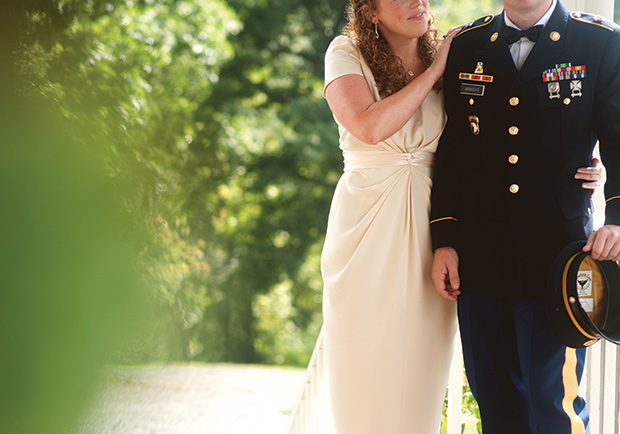We military wives are proud people, with our camo-print purses, yellow ribbon bumper stickers, and a deep love for our husbands and country. We bristle when warned how military life can deplete a marriage. We'll tell you that our marriages are only strengthened by the moves, distance, and unpredictability of military life.
During the first decade of the wars in Iraq and Afghanistan, though, the military divorce rate climbed gradually every year, from 2.6 percent to 3.7 percent. Not until 2012, as troops began to withdraw, did the divorce rate slip for the first time, down to 3.5 percent. Army officials attribute the decrease to better marriage counseling and support programs.
In Army terms, "Healthy relationships contribute to the maintenance of a healthy Army and a secure future force. With increasing demands placed on soldiers and families, to include both frequent deployments and duty relocations, intimate relationships are fully tested." Sir, yes, sir!
Soldiers train and travel away from home beyond the typical 9 to 5 schedule, gone for up to a year at a time when deployed to the Middle East or on cruise overseas. While apart, their spouses carry the load of household responsibilities and, oftentimes, full childcare duties, along with an additional load of worry, loneliness, and stress.
But a less-discussed challenge—one that churches need to know about—is how deployment can test a couple's faith. While a husband and wife may start off on the same spiritual page, they can't support one another in the same ways during deployment. Many spouses are forced to journey with God alone. And like any challenge, a deployment can either draw military spouses into a closer relationship with God—or cause them to question him and fall from faith.
A Florida State University study on religion and military families cited how deployed soldiers tended to dedicate more time to Bible study and prayer at war, while some spouses skipped out on church and experienced periods of doubt. When reunited, their differing beliefs put them at greater risk for dysfunction, the researcher said.
I experienced the opposite: I grew more dependent on God during the year my then-fiancé was in Afghanistan. When weeks would go by without a word from him, I worried something was wrong. My small group would listen to me, hear me cry, and pray. My husband and I shared prayers in letters, affirmations during the occasional Skype call, and Bible studies in care packages. But nothing could replicate for him the Christian community I was experiencing firsthand.
"We're always changing, but when we come back together after a deployment, the changes are a lot more noticeable," says Sara Horn, founder of Wives of Faith, a support group for Christian military wives. "It takes time. You say, 'I need to learn what you experienced, and you need to learn what I've experienced, and together, we need to grow.' " At WivesofFaith.org, women from across the service—active-duty, reserves, and retired—share their stories and find comfort in knowing they're not alone and strength in turning to God.
Such comfort can be offered in church communities, which can pray for the country's leadership, for soldiers' safety, and for the families they leave behind. They can provide a support system for wives who need comfort, solidarity, or practical help. Church members often happily help with yard work, fix a meal, or babysit.
Now, at a church outside of Fort Campbell, Kentucky, my husband and I regularly hear our pastor acknowledge our reality and that of many married couples who find themselves spiritually divergent. Churches that minister to military couples can't assume that everyone in the pews is in a marriage to a Christian whose beliefs line up with theirs. We must help wives and husbands minister within their marriages and share and embody the gospel to one another.
A fellow Army wife told me how she wanted to quit church after suffering a miscarriage while her husband was deployed. From a distance, though, he had turned to God for solace and wanted them both when he returned to attend church together. She reluctantly joined him and to her surprise, found it a place where she could work out her doubts and mend her relationship with God.
This tension is not unique to the military. Faith can drift for many different reasons. At church, married couples may not feel comfortable admitting their relationship isn't as "equally yoked" as it once was. We need to speak about this situation from the pulpit, to continually acknowledge the pressures our marriages face, to keep both spouses from falling away from Christian community.
As we recognize Military Spouse Appreciation Day on May 10 and enjoy a three-day weekend for Memorial Day, consider taking some time to pray for our military service members and their families. And while you're at it, pray for all couples in your midst who need to be spiritually united once again.










